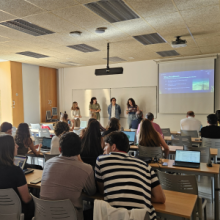The team of students from the Degree in Marine Sciences & Technologies: Paula Carreras, Adriana Cuevas, Irene Gil and Mariona Martínezhave won a European challenge with an innovative proposal to protect marine life around wind turbines in the Gulf of Roses. The initiative is part of the new "Camins Challenges" program, which focuses on learning based on real-life problems.
Creativity and engineering have gone hand in hand at UPC's Barcelona School of Civil Engineering. During the week of October 6-13, more than 30 students from different disciplines put aside their notes to face a very real challenge: How can we install floating wind farms in the Gulf of Roses without harming marine ecosystems?
The challenge, focused on devising nature-based solutions for anchoring systems, brought together future professionals from the Degree in Marine Sciences and Technologies, Civil Engineering, Environmental Engineering and Naval Systems and Technologies Engineering, as well as the Master in Industrial Engineering. A real project to solve real challenges.
The winning team presented an innovative proposal. Their design not only seeks to anchor the wind turbines, but also to act as a catalyst for restoring marine life around the underwater structures.
The jury, made up of a group of experts from top-level companies and research centers such as X1Wind, IREC, BlueNetCat, the Institute of Marine Sciences (ICM) and UPC itself, highlighted the high level of the proposals presented and the surprising capacity for innovation of all the participants.
An award with international projection
For the winners, the award goes beyond recognition. They will have the opportunity to present their idea at a special session of the European WindEurope conference, which will be held in Madrid in April 2026. They will also be able to take their project a step further, opting to have it tested at the prestigious Deltares laboratories in the Netherlands.
More than a challenge: a new way of learning
This initiative is part of the European project NID4Ocean and has been organized by Professors Climent Molins and Anna Mujal, together with ICM researchers, Clémentine Mitoyen Josep Lloret. The same challenge has been held simultaneously in universities in Denmark, Lithuania and Norway.
At the local level, this event has served to premiere the new program "Camins Challenges" for the 2025-2026 academic year. This bet of Barcelona School of Civil Engineering is part of the UPC's initiative "Learning Galaxy", which seeks to modernize higher education through challenge-based learning (CBL). The idea is simple: to expose students to real problems close by so that, in teams and with the collaboration of companies and institutions, they may develop solutions with impact.


